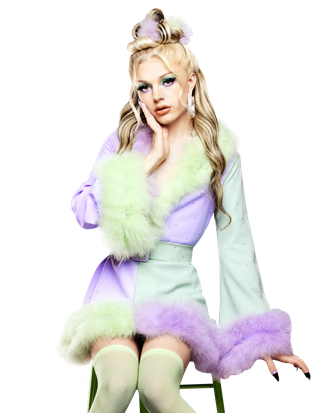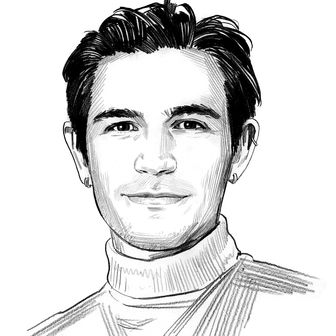
Dakota Schiffer was doing better than expected. The contestant on the current season of RuPaulÔÇÖs Drag Race U.K. began her time on the show with an unceremonious bottom-two placement in the first episode, with the judges rating her aesthetic a resounding meh. For someone who considered herself a fashion queen, it wasnÔÇÖt a good omen. She then followed that bottom with two straight wins, making her the first queen of the season to win two challenges and vaulting her from the bottom of the pack to a serious contender. By the time she was sent home this week, sheÔÇÖd managed to add to her r├®sum├® not only two challenge wins but a seriously good Snatch Game as Dead or Alive singer and Celebrity Big Brother contestant Pete Burns and a defined aesthetic point of view ÔÇö pure Valley of the Dolls Barbie girl.
But ultimately, that was what did her in. The judges were tired of her aesthetic and tired of her looking like a pretty girl all the time ÔÇö a critique that may raise an eyebrow or two given that Dakota is the first trans woman to be cast on Drag Race U.K. She went home for her looks in the makeover challenge when, upon being tasked with turning a Drag Race crew member into her sister, she turned out two looks that resembled previous fashion turns from her repertoire. But in getting eliminated, Dakota made yet another first by being the first queen not sent home by RuPaul, who was mysteriously missing from this episode. Instead, Michelle Visage did the honors. Following DakotaÔÇÖs elimination, we caught up with her to discuss the value of the critiques she received and what it means to be trans and on TV in the U.K.
How are you doing today after watching your elimination?
Very overwhelmed. The response has been incredible ÔÇö IÔÇÖm just so grateful for all the love. I donÔÇÖt think I would change a thing looking back on it now. It was so nice that so many people gravitated toward me, enjoyed me, and were rooting for me in the competition. To have so many people saying ÔÇ£robbedÔÇØ on every bloody social-media website was certainly not something I was expecting this morning, at least the scale of it. IÔÇÖm flattered ÔÇö it just means that you left people wanting more, and thatÔÇÖs what you should always do in life.
What did you feel about the critiques you were given in that last episode?
The makeover challenge is a difficult challenge. The judging is always a bit strange because they change what they want every year, so you really have no idea what theyÔÇÖre looking for. I nailed ÔÇ£family resemblance.ÔÇØ Lucy looked identical to me and would have passed as my youngest sister even though sheÔÇÖs actually ten years older than me, I donÔÇÖt think sheÔÇÖd mind me saying. It was hilarious that she looked so young in my drag. If family resemblance is an aspect of the challenge and IÔÇÖm in the bottom, then what are we being judged on?
To have the ÔÇ£repetitiveÔÇØ comment is fine, I agree with them. My last two runways that I didnÔÇÖt get to show were far departures from everything IÔÇÖd given, and I said that on the runway. I went, ÔÇ£I promise, if you keep me, thereÔÇÖs a massive change coming.ÔÇØ I never got a chance to apply that, and that sucks. I did the challenge to the best of my ability with what I had because you canÔÇÖt change what youÔÇÖve brought. You canÔÇÖt change the runway orders, either, so I had no idea that my Funny Girl look would be so close to makeovers, and obviously theyÔÇÖd seen a lot of 1960s glamor, which might be good for some people, but maybe not for RuPauls Drag Race. Or Michelle VisageÔÇÖs Drag Race, in my case.
Yeah, IÔÇÖm curious. What did it feel like to be judged without RuPaul?
It wasnÔÇÖt treated like a big deal on set, and it didnÔÇÖt feel like a big deal when we were there. IÔÇÖm not a Drag Race sycophant who was like, I need RuPaul to give me my exit message. IÔÇÖve never ever felt like that. ItÔÇÖs funny, people are saying, Oh she never got her send-off from RuPaul, and IÔÇÖm like, ItÔÇÖs not something that affected me massively. The positive critiques from Ru in episode three are the ones that I truly remember and the ones IÔÇÖm always grateful for. I will always go back and watch episode three if I ever need a pick-me-up or to remind myself that I did a good job in the sewing challenge. I had my redemption, and I was the first queen to win two challenges. That is something IÔÇÖll always be proud of. It might not have ended the way I thought it was going to, but I choose not to dwell on the negatives, and IÔÇÖm very grateful for everything that IÔÇÖve managed to achieve.
I was curious about one critique that I felt could have been a little bit loaded for you to hear, specifically as a trans woman, which was when you were told that you need to go bigger with your makeup and that your drag is too ÔÇ£pretty girl.ÔÇØ┬á
I know exactly what youÔÇÖre saying. I know it was an attempt to push me, and IÔÇÖm happy to try different makeup styles. I showed quite a few on the runway, but maybe because it wasnÔÇÖt on the scale of some of the other makeup styles, it didnÔÇÖt come across. I donÔÇÖt wanna say they had an inability to understand or be appreciative of showgirl aesthetics or trans women in drag. I do think that if I presented as male out of drag, the response to my drag would be a lot more positive regarding the transformational aspects. And thatÔÇÖs annoying to me as someone that never had any ÔÇö the medical transition process in the U.K., and trans health care generally in the U.K., is a nightmare, so IÔÇÖve never gone through a medical transition in any regard. This is what I look like, and IÔÇÖm painting whatÔÇÖs there, and I canÔÇÖt change that.
The U.K. specifically isnÔÇÖt used to my kind of drag aesthetic. A traditional drag queen is what we think of first, like a Baga Chipz or a Danny Beard or a Cheddar Gorgeous. TheyÔÇÖre not ÔÇ£typical,ÔÇØ but they are drag queensÔÇÖ drag queens. Being the guinea pig for trans women on Drag Race U.K. has been difficult. People have responded to my drag by saying itÔÇÖs not draggy enough, and there have been lots of microaggressions on Twitter. ItÔÇÖs a little difficult to feel like you have to justify yourself just because you paint a certain way. Every runway look I wore was a fashion reference from Vogue or some catalog from the 1960s. I think it comes across as ÔÇ£simpleÔÇØ when youÔÇÖre standing next to an eight-foot Venus flytrap, so what was I meant to do? IÔÇÖm never, ever going to wear that. IÔÇÖm proud I found an audience that appreciates my work. It might not have been right for that stage, and they might not have been receptive to the subtlety of my drag, and thatÔÇÖs fine. IÔÇÖm glad itÔÇÖs being received positively now, and IÔÇÖm glad I didnÔÇÖt let it change who I was. It would have been disingenuous to represent my drag in any way other than how it was on television.
I did wanna ask about Pete Burns because I felt like there was something so powerful to a trans woman performing a male-identifying character on Snatch Game. I was curious about what inspired that and how it felt to do.
IÔÇÖve always loved Pete Burns ÔÇö my friends and I quote his ÔÇ£Best of Big BrotherÔÇØ video constantly. I always knew I was gonna do him. My playing a male-identifying character is funny in practice, but for Pete Burns, there has been a lot of discourse on their presentation recently because of my Snatch Game, which is really interesting. Pete BurnsÔÇÖs gender presentation was so transgressive ÔÇö and so distinct in terms of plastic surgery ÔÇö and similar to that of someone that would identify as female and so similar to what society views as a hyperfeminine aesthetic that to identify as a man quite strongly in their viewpoint of themself was so powerful at the time. Obviously, thatÔÇÖs not something I share with Pete Burns, but I think in terms of social presentation, thereÔÇÖs actually quite a lot Pete had in common with the trans community. They donÔÇÖt mean the same thing, but itÔÇÖs interesting to me, and I think itÔÇÖs an interesting discussion to have.
Not me making something as silly as Snatch Game into a philosophical discussion! Cheddar would be very proud.
She would!
WeÔÇÖre very much cut from the same cloth, Cheddar and I. Pete BurnsÔÇÖs image and wit are so distinct that it makes them a perfect Snatch Game character. I donÔÇÖt even think of it really, and I think thatÔÇÖs great.
From an American perspective, the view of the queer community and feminism in the U.K. is that thereÔÇÖs a heavy presence of TERFs. What is the specific value of being the first trans woman on Drag Race U.K.?
ThatÔÇÖs certainly what I felt. The trans media landscape in the U.K. is so vicious and nasty. I wanted to represent for trans people, but I can only represent myself because IÔÇÖm only going in as myself. I used that intimidation factor to motivate me. Having a positive representation of a trans person in the U.K. is so rare that to see it be so nuanced was heartwarming. Watching the show, the edit I received was what happened, and it summarized it fabulously, but my friends affectionately joke that it was the ÔÇ£peopleÔÇÖs princessÔÇØ edit. IÔÇÖve been laughing about how positive itÔÇÖs been, but I know that itÔÇÖs so crucial that trans people watching it get to see a trans person having fun and joking with other queer people and being creative and making connections and friendships. We donÔÇÖt get enough of that. We donÔÇÖt get enough people dressed up as Pete Burns for GodÔÇÖs sake or doing a silly voice in an improv challenge.
I was never worried about anyone getting confused with my identity because that happens anyway, and IÔÇÖm fortunate enough to be very secure in who I am, at least identity-wise. The self-confidence journey is happening. But IÔÇÖm never, ever gonna let someone tell me what I need to look like, and thatÔÇÖs a soft spot for a lot of trans people. IÔÇÖm glad I never wavered. The response from trans people telling me what it meant to see me on the show has been beyond anything I could have ever dreamed of. IÔÇÖm just glad it helped just one person, let alone how many people whoÔÇÖve messaged me saying IÔÇÖve helped them. ItÔÇÖs incredible.
I always just assume the worst, which certainly hindered me in some aspects. But I also assumed the worst in regards to the TERFs being angry at my portrayals and the way IÔÇÖm portrayed on the show. ItÔÇÖs funny how I prepared for the worst and thereÔÇÖs barely been that kind of backlash. IÔÇÖm really grateful for that, but at the same time, I know that if it ever did happen, IÔÇÖd be fine because IÔÇÖm secure in my identity and I have the support of my sisters around me, and thatÔÇÖs all IÔÇÖve ever needed to thrive and succeed. Hopefully itÔÇÖs just onward, upward, and the TERFs can go read Judith ButlerÔÇÖs Gender Trouble and educate themselves.


